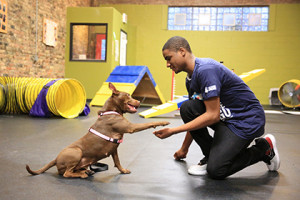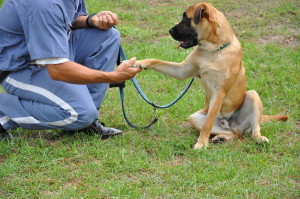Prisoners, Parolees & Incarcerated Juveniles Participate in Dog Training Programs Showing Power of the Human-Animal Bond on Bark and Swagger
Labs are big in the service dog arena. A good friend of mine and owner of a gorgeous black lab named Finn, told me about an organization she’s involved with who takes lab pups, specially selected, and has prisoners train them to become military dogs and Post Traumatic Stress Disorder service dogs for veterans. The program is called Puppies Behind Bars, and it’s amazing. My husband and I attended their annual fundraising gala last fall, and got to see, firsthand, the veterans these dogs are helping and the woman who created and runs this organization. And it got me thinking. There must be so many great programs out there that utilize prisoners, parolees and juvenile offenders to train shelter dogs, which is where my heart lies. So I started poking around on the internet and found some really interesting results. I’ve chosen a few of the many to share with you, and some of the heartwarming stories demonstrating the power of the human-animal bond. Here is a quote from one former inmate, who participated in the Dawgs in Prison program: “I woke up during my first year of the DAWGS program. My attitude changed. My routine changed. My health changed. My priorities changed. Everything changed in my life in order for me to be responsible enough to take care of one of God’s precious creations. DAWGS gave me the wisdom to see what kind of changes were needed in my life in order to be a productive citizen again after a total of 26 years behind bars.” I hope these organizations and stories inspire you and make you feel as heartened as they did me.
Prison Pet Partnership
This wonderful program, based out of Washington State, helps prisoners within the Washington Corrections Center for Women gain valuable skills in the fields of dog training, grooming and boarding, by working first hand with rescue dogs taken from local shelters with the goal of turning them into service and therapy dogs. All inmate employees have the ability to work towards Pet Care Technician certification, levels One and Two, which provides them with tangible skills for employment once they’re again out in the world. The dogs go from being imprisoned, to leading a life of service to the inmate who cares for them. They not only are taught the basic training skills like sit, stay, etc., they learn to anticipate the needs of individuals who have seizures or an illness like Multiple Sclerosis, or who live with various disabilities, helping them with daily activities so they can be more independent.
The rigorous training program lasts about eight months and only one out of every 15-20 dogs has the temperament and skills to become a service or therapy dog. The others are offered for adoption to families, as part of their Paroled Pets program.
Prison Pet Partnership, operating within Washington State criminal justice system, has been a model for the nation in the rehabilitation of offenders. It began in 1981 as the result of a collaborative effort between Sister Pauline, a Dominican nun, and the late Dr. Leo Bustad, former chair of Washington State University’s veterinary program, who believed that inmate rehabilitation could be facilitated by the human-animal bond. Sister Pauline and Bustad worked cooperatively with Washington State University, Tacoma Community College, and the Washington State Department of Corrections to create this innovative program within the Washington Corrections Center for Women (WCCW).
Since its inception, the program has placed over 700 dogs as Service, Seizure, Therapy Dogs and in families as Paroled Pets in the Pacific Northwest. They also provide animal-assisted therapeutic visits to local convalescent centers, help students improve reading skills by having dogs listen while children read aloud. In 1986, Prison Pet Partnership was one of the top ten finalists for Innovations in State and Local Government recognized by the Ford Foundation and the John F. Kennedy School of Business at Harvard University. In 1997, General H. Norman Schwarzkopf came to PPP to host “What’s Right in America” for NBC. He felt that the program exemplified how the prison system can aid in the rehabilitation of inmates while serving the community at large. A great, great organization and program.
Paws On Parole
Located in Gainesville, Florida, Paws on Parole pairs adoptable dogs from the Alachua County Animal Services with inmates from a partnership between the Florida Department of Corrections Gainesville Work Camp and the Alachua County Jail. For 8 weeks, inmates work with the animals, teaching them basic training skills necessary to pass the American Kennel Club’s Canine Good Citizen test. Inmates, trained by two certified dog trainers who work with the program, learn about daily dog care, including feeding, grooming, and routine health care, as well as positive training techniques. They learn to train the dogs to the standards of the American Kennel Club’s Canine Good Citizens (CGC) test. The CGC tests dogs on ten items measuring temperament and obedience. The program recognizes dogs who have “good manners at home and in the community,” according to the AKC.
At the end of the training period, the dogs are eligible for adoption. The program has become so popular, that most dogs are already spoken for before they graduate, and go to their new homes as soon as they’ve completed testing. But all applications are carefully screened to provide each dog with the best family for it’s personality and needs. What’s also great about this program, is they offer an Aftercare Network, which supports the new adoptee family in adjusting to and integrating the dog into its new home. They encourage the new owners to continue the dog’s training and to take the CGC test together with their dog, so they can be a certified team.
Safe Humane Chicago’s Lifetime Bonds
This is another amazing program, but Lifetime Bonds focuses on at risk youth. The way they put it: the program offers an opportunity for at risk youth and at risk dogs to help each other. Pretty cool. Under the supervision of volunteer adult trainers, these incarcerated boys from the Illinois Department of Juvenile Justice are taught to bond with, socialize and train shelter dogs vetted for safety from Safe Humane Chicago‘s Dog Ambassador Program, over the course of 3 months. They are also taught about issues related to animal welfare and safety, like pet overpopulation and dog fighting, and learn about the many job opportunities available in the pet industry. The program has so touched many of these children, it has a 95% completion rate. Once the boys graduate, 20% of them participate in a paid internship with the Court Case Dogs Program, which finds safe homes for 99 percent of the animals that have been relinquished (voluntarily or by court order) by owners charged with animal cruelty and neglect. And, 75 percent of the youth do not reoffend within one year of release.
The first two things Lifetime Bonds teaches the boys is both how to maintain eye contact with the dogs and how to touch then treat the dogs. “We want dogs to learn hands are for good things, not just for hitting,” says director Cynthia Bathurst.
Lifetime Bonds graduate Dwaun was afraid of dogs when he started the program. He previously perceived the animals as aggressive and violent. However, after starting classes, he began to empathize with the shelter dogs he worked with: “They feel how people in jails feel. They don’t want to be in cages.”
Moved by the fact that he was exposed to so many abandoned dogs, Dwaun wrote a poem about his experience with Lifetime Bonds:

Illinois Department of Juvenile Justice’s Supervisor Frank Jones is amazed by the way the incarcerated teens are working with the animals at Lifetime Bonds: “This is one of the few programs we don’t need security in.”
I was amazed by what I learned about these programs, and I just scratched the surface; there are lots more. It was heartening to see how those who are or were in prison are helping dogs who’d been imprisoned in shelters to find new lives. Really, through each other, they were both finding new meaning to their lives. I can’t think of a better way to teach, give and provide love for humans and animals.
Until next time…








